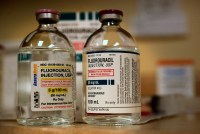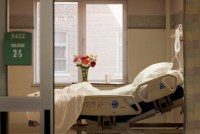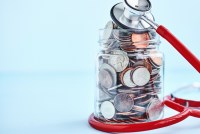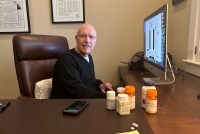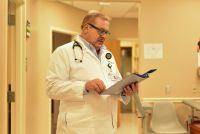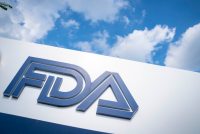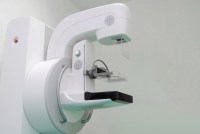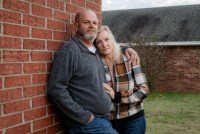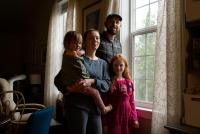Latest KFF Health News Stories
Journalists Talk Cost of Weight Loss Drugs and Lack of Obesity Doctors to Manage Their Use
KFF Health News and California Healthline staff made the rounds on national and local media this week to discuss topical stories. Here’s a collection of their appearances.
Amgen Plows Ahead With Costly, Highly Toxic Cancer Dosing Despite FDA Challenge
The FDA told Amgen to test whether a quarter-dose of its lung cancer drug worked as well as the amount recommended on the product label. It did and with fewer side effects. But Amgen is sticking to the higher dose — which earns it an additional $180,000 a year per patient.
Una prueba genética podría salvar la vida de cientos de pacientes en quimioterapia
Estos tipos de quimioterapia comunes son difíciles de tolerar en general, pero para los pacientes que tienen deficiencia de una enzima que metaboliza la droga, puede ser una tortura o causar la muerte.
City-Country Mortality Gap Widens Amid Persistent Holes in Rural Health Care Access
People in their prime working years living in rural America are 43% more likely to die of natural causes, like diseases, than their urban counterparts, a disparity that grew rapidly in recent decades, according to a new federal report.
Overdosing on Chemo: A Common Gene Test Could Save Hundreds of Lives Each Year
The FDA and some oncologists have resisted efforts to require a quick, cheap gene test that could prevent thousands of deaths from a bad reaction to a common cancer drug.
En California, la cobertura de salud ampliada a inmigrantes choca con las revisiones de Medicaid
El proceso de redeterminación ha afectado de forma desproporcionada a los latinos, que constituyen la mayoría de los beneficiarios de Medi-Cal.
California’s Expanded Health Coverage for Immigrants Collides With Medicaid Reviews
A state policy to extend Medi-Cal to qualified Californians without legal residency is running up against a federal requirement to resume eligibility checks. The redetermination process is causing many Latinos, who make up a majority of Medi-Cal beneficiaries, to be disenrolled.
Operating in the Red: Half of Rural Hospitals Lose Money, as Many Cut Services
A recent report finds half of America’s rural hospitals are losing money, and many are struggling to stay open. Researchers and advocates worry the hospitals’ financial spiral will have immediate and long-term health effects on their communities.
Toxic Gas That Sterilizes Medical Devices Prompts Safety Rule Update
The Environmental Protection Agency is tightening regulation of ethylene oxide, a carcinogenic gas used to sterilize medical devices. The agency is trying to balance the interests of the health care industry supply chain with those of communities where the gas creates airborne health risks.
Patients See First Savings From Biden’s Drug Price Push, as Pharma Lines Up Its Lawyers
A restructuring of the Medicare drug benefit has wiped out big drug bills for people who need expensive medicines. But the legal battle over drug negotiations means uncertainty over long-term savings.
Early Detection May Help Kentucky Tamp Down Its Lung Cancer Crisis
After a decade of work, a Kentucky program launched to diagnose lung cancer earlier is beginning to change the prognosis for residents by catching tumors when they’re more treatable.
La FDA finalmente prohibiría peligroso químico en productos para alisar el cabello
El primer estudio que vinculó los alisadores de cabello con el cáncer de útero, publicado en 2022, encontró que el uso frecuente de estos químicos duplica con creces el peligro.
FDA’s Plan to Ban Hair Relaxer Chemical Called Too Little, Too Late
The FDA’s recent notice that it would move to ban formaldehyde in hair-straightening products comes more than a decade after researchers raised alarms about health risks. Scientists say a ban would still leave many dangerous chemicals in hair straighteners.
Mamografías que usan inteligencia artificial cuestan dinero extra… pero, ¿vale la pena?
Este software puede identificar patrones y anomalías que los radiólogos humanos podrían pasar por alto. Pero no es el estándar de atención.
Hoping to Clear the Air in Casinos, Workers Seek to Ban Tobacco Smoke
Casinos in several states are fighting efforts to ban smoking, and trying to roll back existing anti-smoking laws. One planned facility even moved outside a city’s limits because of voter-approved smoking restrictions.
Mammography AI Can Cost Patients Extra. Is It Worth It?
Artificial intelligence software to aid radiologists in detecting problems or diagnosing cancer has been moving rapidly into clinical use, where it shows great promise. But it’s a turnoff for some patients asked to pay out-of-pocket for technology that’s not quite ready for prime time.
Cancer Patients Face Frightening Delays in Treatment Approvals
Delaying cancer treatment can be deadly — which makes the roadblock-riddled process that health insurers use to approve or deny care particularly daunting for oncology patients.
Suzanne Somers’ Legacy Tainted by Celebrity Medical Misinformation
The popular actress and author, who died this week, also can be remembered as a progenitor of selling dubious medical information to a trusting public.
She Received Chemo in Two States. Why Did It Cost So Much More in Alaska?
A breast cancer patient who received similar treatments in two states saw significant differences in cost, illuminating how care in remote areas can come with a stiffer price tag.
‘Like a Russian Roulette’: US Military Firefighters Grapple With Unknowns of PFAS Exposure
Federal research linking “forever chemicals” to testicular cancer confirms what U.S. military personnel long suspected. But as they seek testing for PFAS exposure, many wonder what to do with the results. There’s no medical treatment yet.





